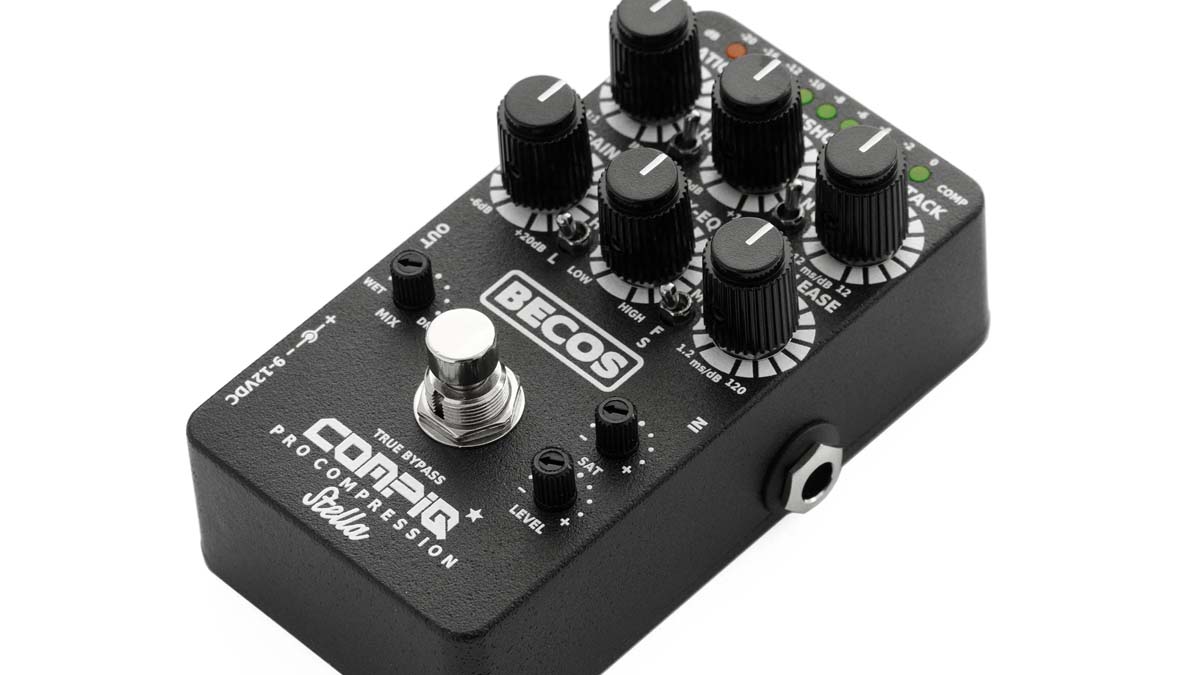MusicRadar Verdict
The Stella is a compressor that could prove itself vital as part of any guitarist or bassist's pedalboard, offering fully-featured, studio-quality control over your dynamics in compact form.
Pros
- +
It's a top-quality compressor.
- +
Heaps of control over your sound.
- +
Compact form.
Cons
- -
You would not want to have to adjust those smaller dials onstage.
- -
It is expensive for the casual user of compression.
MusicRadar's got your back
Becos CompIQ STELLA Pro Compressor: What is it?
Like getting a pay rise, buying a new pair of well-fitting shoes, or falling in love, a compressor is just one of those things that improves your lot in life. It offers simple pleasures, not as dramatic as the fuzz pedal or chorus, but maybe one day players will recognise the romance in the compressor pedal.
They are one of those things that can simply make your sound better. This can be achieved with a simple device. One of the most popular models on the market is the MXR DynaComp. It offers two knobs and some musical squash, giving you the capability to take a tight rein on your dynamics – taming the peaks, boosting the troughs.
Sometimes, however, we need more control, and that is where a compressor such as the Becos FX CIQ5 CompIQ Pro Stella Compressor comes in.
It can be used for electric guitar or bass guitar and can be described simply as a studio-quality VCA compressor in a compact stompbox that won’t take up too much room on your pedalboard. And, going by its performance, it might well be that last one you would take off your ‘board.
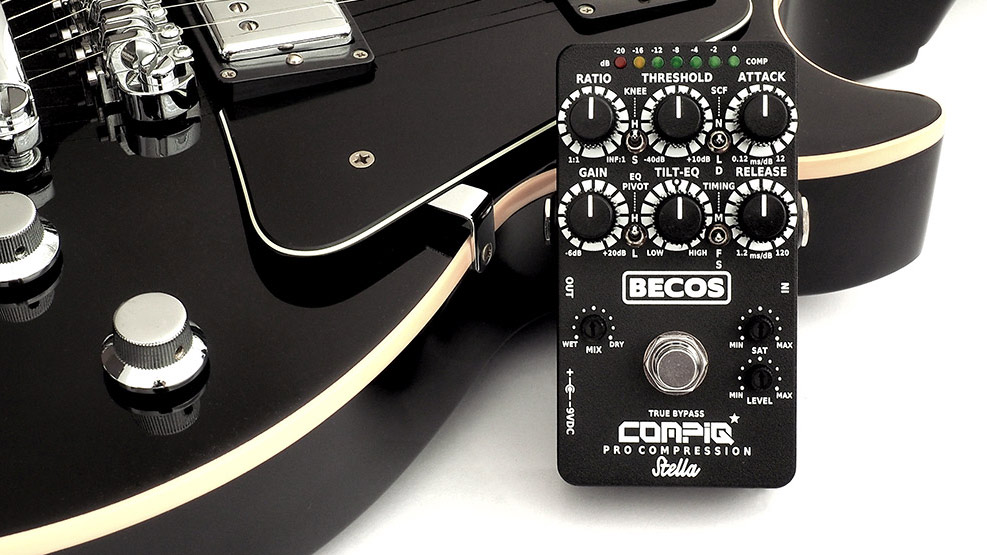
It is not cheap, retailing at £360 street. Not every bassist needs all these features. But the comprehensive control it offers could well make it essential for players who cover all different styles, with a guitar pick, with fingers, and those who take a percussive approach to the instrument – all of which place different dynamic demands upon your tone. If you own a guitar, then all the better; it’ll sort that out, too.
There are a heck of a lot of controls, six standard-sized dials for Ratio, Threshold, Attack, Gain, X-EQ and Release, plus switches for hard/soft knee settings, controlling the interaction between Threshold and Ratio, Timing, which activates an auto-timing feature that intuitively controls attack/release times – slow or fast – based on how long or short your transients are, and SCF which activates a side chain filter.
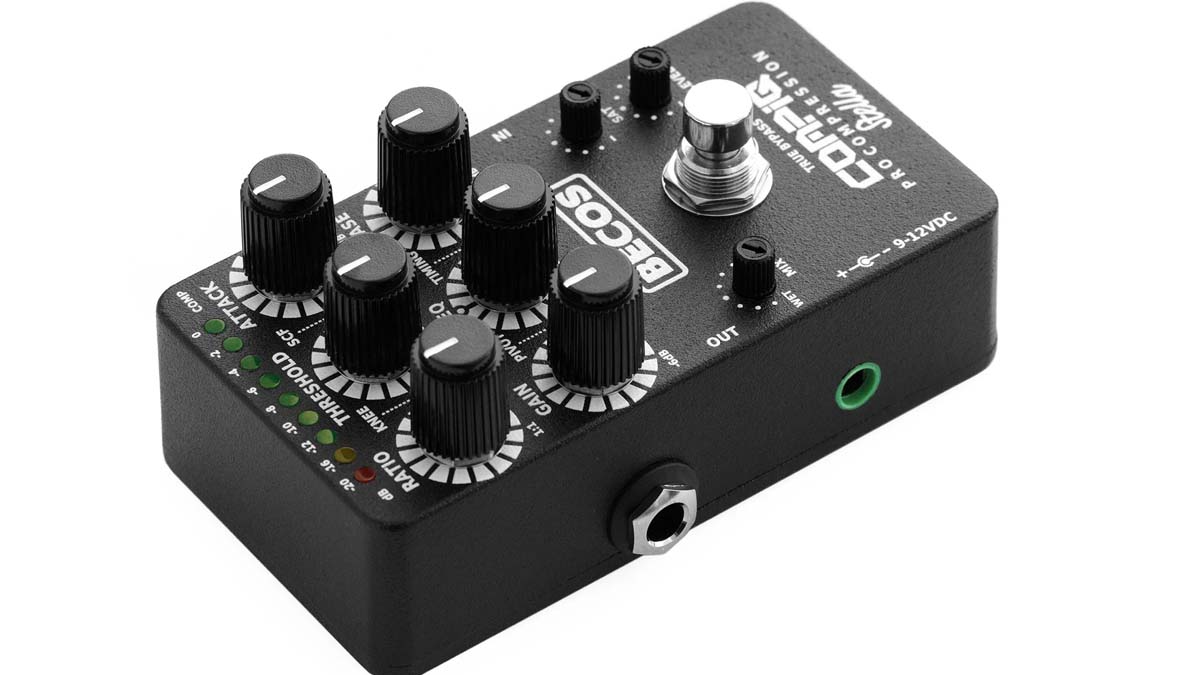
When activated, the side-chain filter prevents the compressor from getting too excited by the low-frequencies and putting the squeeze on the highs. The side-chain is frequency-dependent, and it progressively filters those below 1KHz, and there are three settings; Normal, Deep, and Low. There is also an EQ Pivot switch, which sets the pivot frequency between high (1KHz, ideal for guitar) and low (330Hz, for bass).
Want all the hottest music and gear news, reviews, deals, features and more, direct to your inbox? Sign up here.
Finally, you have three mini-dials for Wet/Dry Mix, Saturation, which controls a Tape Saturation analogue circuit that is applied to your dry signal – effectively adding the analogue warmth of ‘60s era tape distortion – and can then be blended with your compressed or wet signal, without it having an effect on how the compressor is working.
Becos CompIQ STELLA Pro Compressor: Performance and verdict
With all of these controls at your disposal, the Stella can perform a multitude or roles, and with the appropriate adjustment of the Threshold dial it can be used with line-level inputs. This level of control can take a minute to dial in, but then, in many instances, your compressor is set-and-forget.
Also, this level of control takes away nagging frustration of getting close but not close enough when it comes to compression. For many bassists, this might be achieved via the SCF switch. It can be a godsend if you feel the compressor is taking liberties with the low end, and can give you the requisite level of roundness and punch.
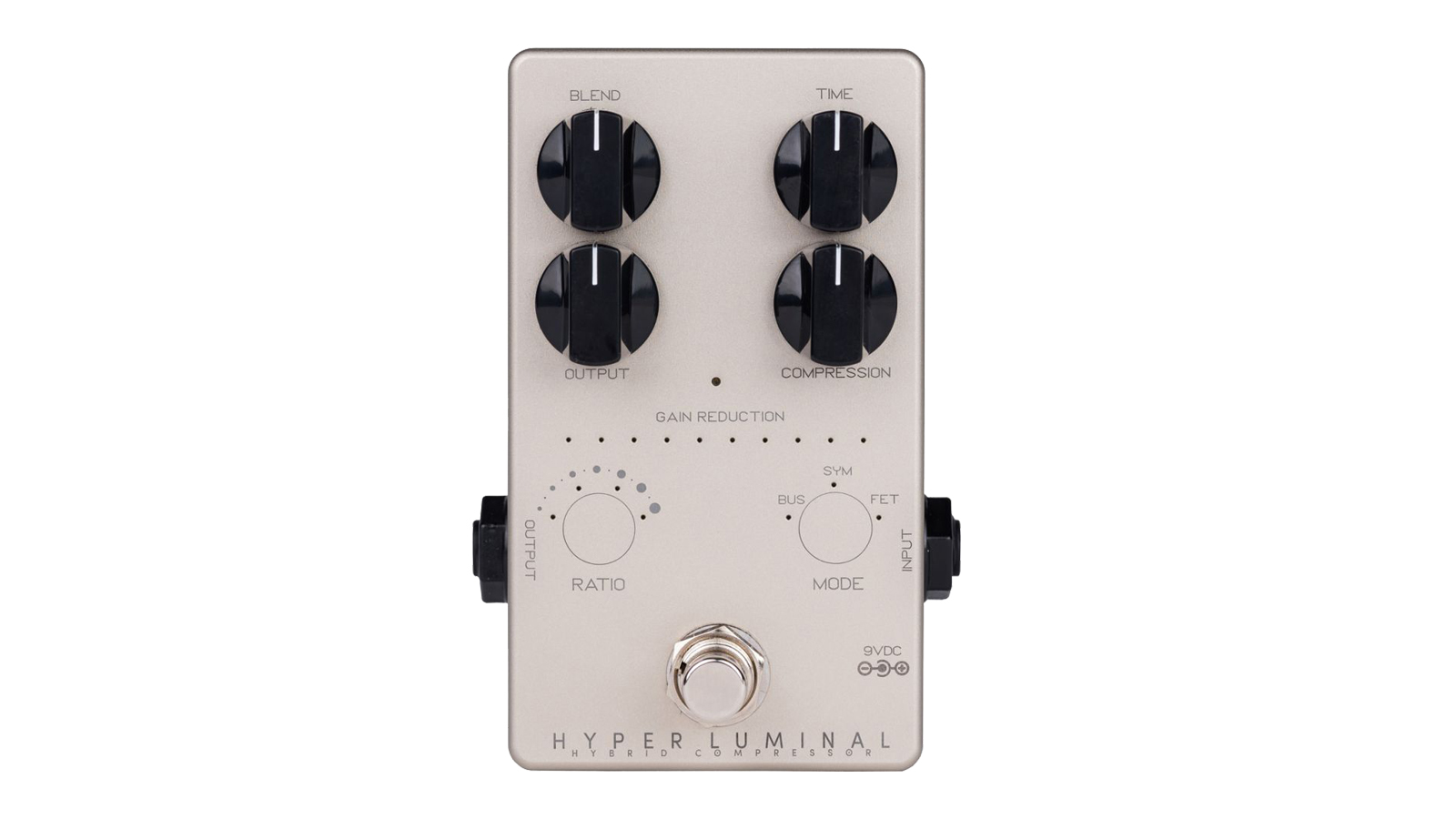
• Darkglass Hyper Luminal Hybrid Compressor
The idea here is to encompass two vintage compressor tones, plus Darkglass’s now-discontinued Super Symmetry unit, in one. It’s the SYM mode that offers Darkglass’s most bass-friendly sonic features – super-punchy top end and high mids that can cut through the rest of your band like a machete through a piñata.
• Wampler Ego Compressor
The blend knob that gives you loads more options for a natural but compressed sound, allowing some of your unprocessed tone through in parallel with the compressed. The tone knob can counteract any dulling and will add some sparkle if needed.
• Boss CP-1X Compressor
The ubiquity of Boss units means that the layout is intuitive, moreover, there are simply so many decent sounds available in this pedal that it’s hard to come unstuck.
You don’t need to be overly fussy either to get some great sounds. The auto timing settings can be an excellent starting point for experimentation. There’s method behind this automated approach too.
The Stella is equipped with an Auto Adjusting Dynamic Timing circuit that listens in, if you like, and adjusts attack and release to suit picking dynamics. Short and percussive transients are handled with shorter times. The Auto Fast setting listed typically between 5-7ms for attack, 70ms for release, while the slow setting is typically between 10-15ms for attack, 100-220ms for release.
The difference this can make to your playing can be profound, bringing clarity to certain approaches that hitherto could be lost in the mix. The quality of the sound is superb, and mixing in the tape saturation can bring some musically inspiring heat to your sound, and a gentle drive that helps your notes blossom and adds character to your tone.
Another helpful feature is the alignment of LEDs across the top of the enclosure, which keep you up to date on how hard the compressor is working. But chief among the helpful features is the balanced DI output, which extends the usefulness of the Stella to above and beyond.
We might fumble a bit with these controls in a low-light setting, as on a stage, but as mentioned above, compression tends to be set and forget. There’s not much else Becos could have squeezed on here, though it is worth noting that there is a larger dual-band/stacked compressor in the range, the Twain, if you wanted more.
MusicRadar verdict: The Stella is a compressor that could prove itself vital as part of any guitarist or bassist's pedalboard, offering fully-featured, studio-quality control over your dynamics in compact form.
Becos CompIQ STELLA Pro Compressor: The web says
"If you know how to use a compressor, and have ever been frustrated by the limitations of pedal comps over studio gear or great plugins, the Becos Stella is exactly what you’ve been looking for. What’s more, it comes at a price point at least one order of magnitude lower than the discontinued classic studio compressors that its sound approaches. Bravo!"
Bass Player Magazine
"There’s no real need to stray from the basics with either guitar or bass: stick to soft knee, normal sidechain and fast timing and it’s just a question of tweaking the ratio and threshold to taste then playing with the gain and EQ for balance. Hiss never becomes a problem, and dialling in some gritty tape saturation can be a great way to further energise a clean tone."
Guitar
Becos CompIQ STELLA Pro Compressor: Hands-on demos
Becos FX
Brett Kingman
Becos CompIQ STELLA Pro Compressor: Specifications
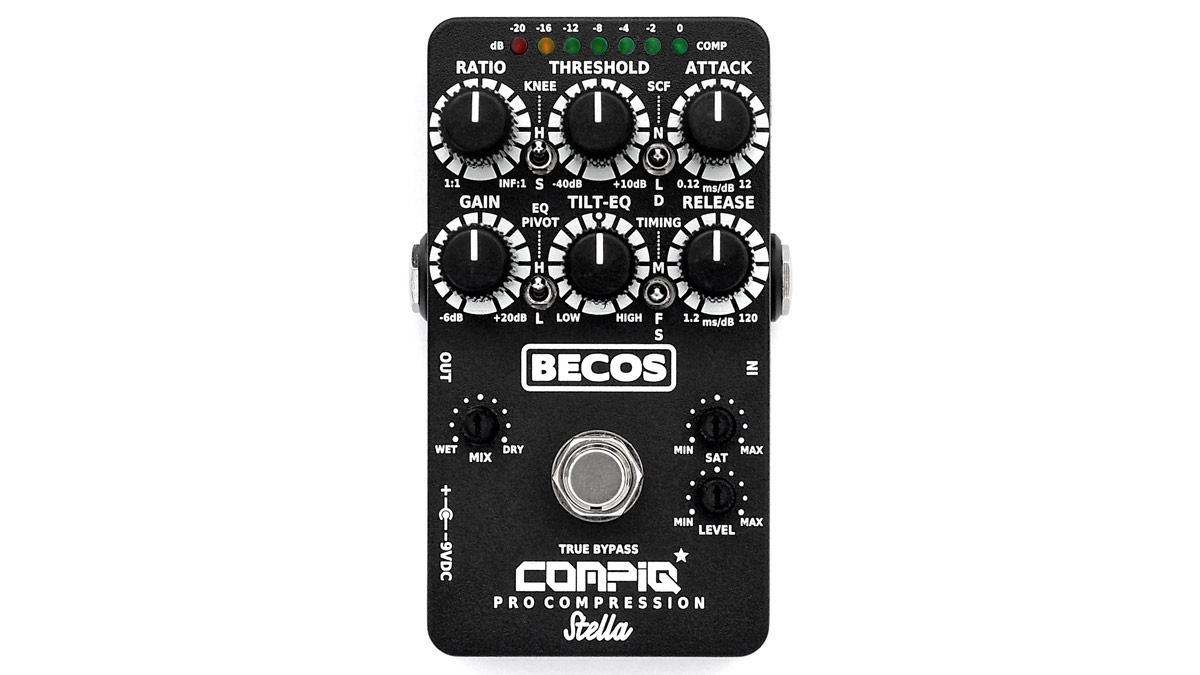
- TYPE: Compressor pedal
- MADE IN: Romania
- FEATURES: Ratio, Threshold, Attack, Gain, X-EQ, Release pots, Knee, SCF, Knee Pivot, Timing switches, Wet/Dry, Saturation and Level rotary controls, balanced output Dimensions: 4.4” x 2.7” x 2” /112 x 68 x 50mm
- POWER: 9-12v DC
- WEIGHT: 14 oz / 400g
- CONTACT: Becos
MusicRadar is the number one website for music-makers of all kinds, be they guitarists, drummers, keyboard players, DJs or producers...
- GEAR: We help musicians find the best gear with top-ranking gear round-ups and high-quality, authoritative reviews by a wide team of highly experienced experts.
- TIPS: We also provide tuition, from bite-sized tips to advanced work-outs and guidance from recognised musicians and stars.
- STARS: We talk to musicians and stars about their creative processes, and the nuts and bolts of their gear and technique. We give fans an insight into the craft of music-making that no other music website can.
